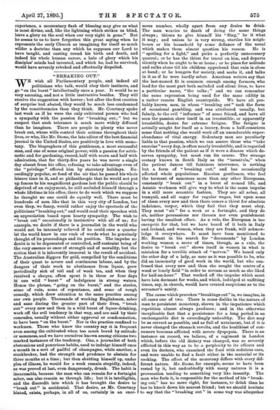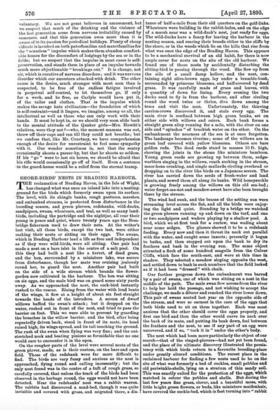"BREAKING OUT."
WE wish all Parliamentary people, and indeed all politieians who talk, would obey their instincts, and go "on the burst" intellectually once a year. It would be so very amusing, and not a little instructive besides. They will receive the suggestion with horror; but after the first emotion of surprise had abated, they would be much less condemned by the constituencies than they think. Mr. Courtney spoke last week as if he were the only cultivated person who had a sympathy with the passion for "breaking out;" but we suspect that such tolerance is much more widely diffused than he imagines. There are people in plenty who never break out, whose wills control their actions throughout their lives, or who, like Mr. Stone, the late editor of the best financial journal in the United States, are positively in love with mono- tony. The biographers of this gentleman, a most successful man, and one of some original power, with a passion for arith- metic and for gardening, record, half with scorn and half with admiration, that for thirty-five years he was never a single day absent from his office, refusing to take advantage even of the "privilege" offered him by statutory holidays. Ex- ceedingly popular, so fond of the air that he passed his whole leisure time in it, and so philanthropic that he would not put up fences to his magnificent gardens lest the public should be deprived of an enjoyment, he still secluded himself through a whole lifetime in his office, there to do work which we suppose he thought no one could do equally well. There must be hundreds of men like that in this very city of London, but even they, we fancy, would rather enjoy the spectacle of the politicians" breaking out," and would read their speeches with an appreciation based upon hearty sympathy. The wish to "break out" occasionally is instinctive with all .of us; for example, we doubt if there is a journalist in the world who would not be intensely relieved if he could once a quarter let the world know in one rush of words what he genuinely thought of its proceedings and its position. The impulse no doubt is to be deprecated or controlled, self.restraint being of the very essence at once of strength and of morality, but the notion that it is inherently immoral is the result of accident. The Australian diggers for gold, compelled by the conditions of their quest to severe and continuous labour, and by the dangers of their work to abstinence from liquor, grew periodically sick of toil and of weak tea, and when they received a cheque, often spent it in three or four days in one wild " burst " of indulgence in strong waters. Hence the phrase, "going on the burst," and the stories, some of ruin, some of repentance, and some of rough comedy, which drew attention to the same practice among our own people. Thousands of working Englishmen, sober and sane during the greater part of their lives, "break out" every now and then in a wild burst of liquor-drinking, work off the evil tendency in that way, and are said by their comrades, usually without either approval or condemnation, to have been "on the burst." Nor is the practice confined to workmen. Those who know the country say it is frequent even among the cultivated when too much bored by solitude or sameness, and we have ourselves known among citizens two marked instances of the tendency. One, a journalist of both abstemious and penurious habits, used to indulge himself once a month in a sort of pailful of champagne, while another, a stockbroker, had the strength and prudence to abstain for three months at a time ; but then shutting himself up, under plea of illness, he would for a week remain stupidly, indeed, as was proved at last, even dangerously, drunk. The habit is inexcusable, because the man who can remain for a fortnight sober, can also remain so through life ; but it is intelligible, and the discredit into which it has brought the desire to "break out" is accidental. That desire, as Mr. Courtney hinted, exists, perhaps, in all of us, certainly in an enor- mous number, wholly apart from any desire to drink. The man wearies to death of doing the same things always ; thirsts to give himself his "fling." be it what it may ; and unless he is very strong, startles his neigh- bours or his household by some defiance of the usual which makes them almost question his reason. He is "spoiling for a fight," and picks a perfectly unnecessary quarrel; or he has the thirst for travel on him, and departs silently when be ought to be at home ; or he pines for solitude and sulks alone till his children apprehend that ruin is close at hand ; or he hungers for society, and seeks it, and talks in it as if he were hardly sober. American writers say that the last-named fit is common enough among farmers, who lead for the most part both secluded and silent lives, to have a particular name, "the talks ; " and we can remember the same expression being used for the same oddity in a rather remote English countryside. We have all pro- bably known men, in whom "breaking out" took the form of occasional gambling, and was attributed usually, but falsely, to the evil " influence " of some friend, and have all seen the passion show itself in an irresistible, or apparently irresistible, desire for extreme fatigue. The fatigue is actually sought for itself as a luxury, from a half-conscious sense that nothing else would work off an unendurable super- abundance of vital energy. Sedentary men are peculiarly liable to that passion, which we can assure those who "take exercise" every day, is often nearly irresistible, and is regarded by the friends of the patient as if it were a disease which de- serves sympathy, but must run its course. The strange ecstasy known in South Italy as the "tarantula," when the patient dances till faintness intervenes, is nothing but a form of "breaking out," and has occasionally affected whole populations. Russian gentlemen, who feel the torment of sameness more than any other Europeans, constantly "break out" in a burst of nomad life, and Asiatic workmen will give way to what is the same impulse in a still more eccentric fashion. They are all sober, all tranquil, and all eager for regular wages, but upon some of them every now and then there comes a thirst for absolute indolence, torpor, which they feel that they must obey. They must " sit " for a week or a fortnight, and they do sit, neither persuasions nor threats nor even punishment having the smallest effect. As a rule, the European is too energetic for that, but we have heard of it both in Italy and Ireland, and women, when they are frank, will acknow- ledge it everywhere. It must have been mentioned to Mr. Besant in his search for "documents" by London working women a score of times, though, as a rule, the desire to "break out" shows itself in women in what is mistaken for a terrible attack of "nerves." We heard only the other day of a lady, as sane as it was possible to be, who did an immensity of good work in the world, but who con- fessed that every now and then she sought the centre of a wood or lonely field "in order to scream as much as she liked for half-an-hour." That worked off the impulse which must have lain dormant for weeks, and which, indulged at unfitting times, say, in church, would have created suspicions as to the screamer's sanity.
The cause which provokes "breakings out" is, we imagine, in all cases one of two. There is some dislike in the nature of man to persistent monotony, shown in the impatience which repetition almost always produces ; and in the otherwise inexplicable fact that a persistence for a long period in an unchangeable diet is exceedingly unhealthy. The diet may be as correct as possible, and as full of nutriment, but if it is never changed the stomach revolts, and the healthiest of con- sumers becomes afflicted with severe dyspepsia. There is an instance on record, we believe, of a regiment in London which, before the old dietary was changed, was so severely afflicted in this way as to be a perplexity to its officers and
even its doctors, who examined the food with sedulous care, and were unable to find a fault either in tke material or its cooking. The effect of the monotony differs with every dif-
ferent nature. Mr. Stone, for example, seems to have been rested by it, but undoubtedly with many natures it is a
provocation tending to something very like insanity. The
man who feels it, is responsible for the method of his " break- ing out," has no more right, for instance, to drink than he
has to knock down his nearest friend; but we should hesitate to say that the "breaking out" in some way was altogether
voluntary. We are not great believers in amusement, but we suspect that much of the drinking and the violence of the last generation arose from nervous irritability caused by sameness, and that this generation owes more than it is aware of to its passion for periodical holidays. Plenty of cheap ridicule is lavished on both paterfamilias and materfamilias for the " senseless " impulse which makes them abandon comfort- able homes for the discomfort of lodgings by the sea or in the fields; but we suspect that the impulse in most cases is self- preservation, and stands them in place of an impulse towards much more objectionable " breakings out." It is change, not air, which is curative of nervous disorders ; and it was nervous disorder which our ancestors attacked with drink. The other cause is the desire, much stronger with most men than is suspected, to be free of the endless fatigue involved in perpetual self-control, to let themselves go, if only for a week, and be free, as Carlyle would have put it, of the tailor and clothes. That is the impulse which makes the savage hate civilisation—the foundation of which is self-restraint—and it lingers, we imagine, among us all, the intellectual as well as those who can only work with their hands. It must be kept in, or we should very soon slide back to the mental attitude of the Quaker girls—Mrs. Howitt's relatives, were they not P—who, the moment mamma was out, threw off their caps and ran till they could not breathe; but we confess that, like Mr. Courtney, we have comprehension enough of the desire for unrestraint to feel some sympathy with it. Our wonder sometimes is, not that the sentry occasionally shoots a passer-by, but that he shoots so seldom. If his " go " were to last six hours, we should be afraid that his rifle would occasionally go off of itself. Even a sentence to the guard-house would be a relief from the eternal tramp.



















































 Previous page
Previous page